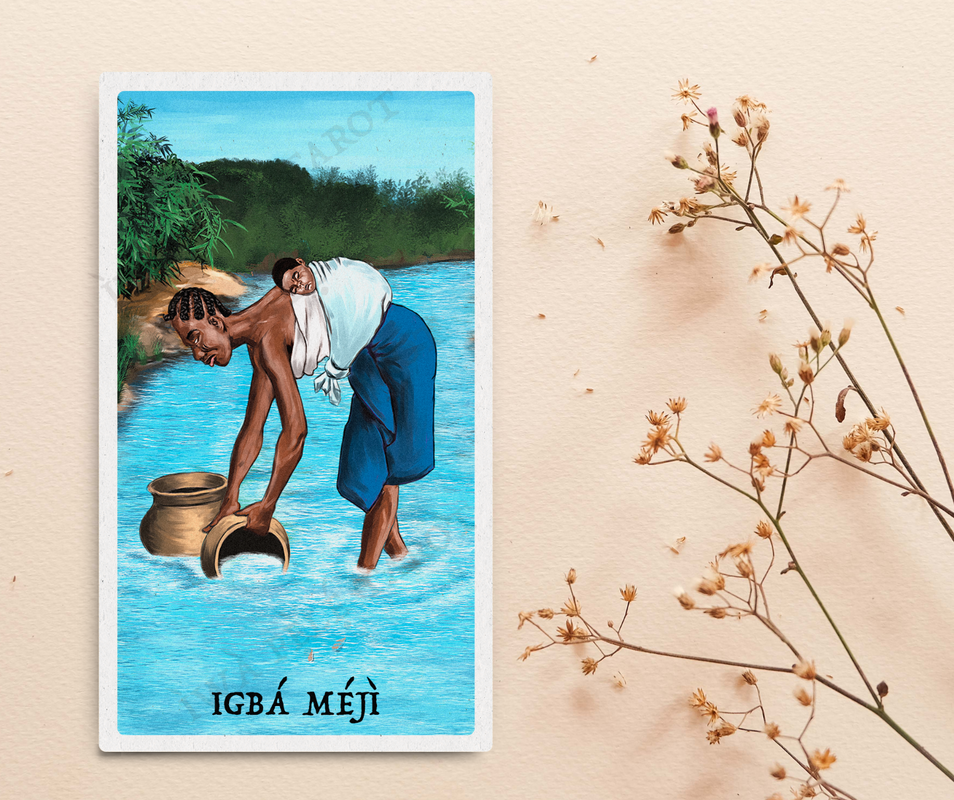|
© Excerpt from Ìwà Pẹ̀lẹ́ Tarot Handbook by Native Authority Tarot Abiyamọ, ab'ọ̀já gbòrò gboro A stream flows gently under the glow of the early morning sun. An abiyamọ with a baby strapped to her back stands quietly, fetching water with two earthenware water pots. The air is still and cool, as ripples upon the clear blue water sparkle and dance in the sunlight. The baby on her back sleeps blissfully, at peace and content to be close to its mother’s comforting warmth, scent, and touch, reassured of her affection and devotion. The serene moment radiates feelings of peace and tranquility, as if basking in the warm embrace of the sun, and captures the essence of emotional harmony and the deep bond of love between mother and child. As with many Yorùbá words and phrases, abiyamọ has no direct translation in English; the closest meanings are nurturer, one who has risked life to birth life, sustainer and mother. In traditional Yorùbá culture, motherhood is highly desirable and celebrated, with expectant mothers almost deified and termed abaraméjì, meaning ‘a being with two bodies’ or ‘one, dual in nature’. It is said that the process of going from abaraméjì to abiyamọ is powerful and transformative and carries supreme aṣẹ. This is why the Yorùbás say “Òrìṣà bí ìyá ò sí l’áyé” (No other Òrìṣà like the mother exists on earth). Igbá Méjì speaks to the depths of human connections and emotional bonds. It reminds us of the beauty of unconditional love, the importance of finding harmony and balance, and the power that comes from the union of two individuals or energies. Incorporating the symbolism of abaraméjì, this card encourages us to embrace the concept of duality and recognize the strength that comes from partnerships. Be inspired to cultivate deep, meaningful connections and celebrate the power of love and togetherness. Dedicating one’s life to another is the ultimate expression of love. It transcends the fleeting pleasures and material possessions, providing a deeply felt sense of fulfillment and purpose. Despite what many people believe, it is not about losing one's identity or self in the process, but about finding a deeper sense of purpose and fulfilment through the bond shared with a loved one. It is about building a partnership based on trust, respect, and mutual growth. Together, two individuals embark on a shared journey, shaping each other’s lives and experiences. But even as Igbá Méjì draws on the unparalleled connection between the abiyamọ and the child, life progresses, seasons change and roles shift. The nurturer becomes the nurtured, and the nurtured becomes the nurturer, transforming the bond between an adult child and an elderly parent. The once-dependent child now assumes the role of a caregiver, providing love, care, and support for their aging parent. Despite the challenges that come with the passage of time, the connection grows stronger, transforming into one based on mutual admiration and gratitude. Dedicating one’s life to another is a beautiful testament to the depth of our capacity to love and be loved. In Ire: Admiration, affection, affinity, agreement, compassion, compromise, connection, devotion, engagement, interdependence, mutual love, nonpartisanship, optimism, partnership, receptiveness, reconciliation, self love, sincerity In Ibi: Ambiguity, antagonism, anxiety, bigotry, bitterness, calumny, codependency, disconnection, discord, disparity, disregard, dissolution, enmity, hesitation, hypocrisy, indifference, impressionable, liability, neglect, pessimism, possession, restriction, separation, tough love
Comments are closed.
|



